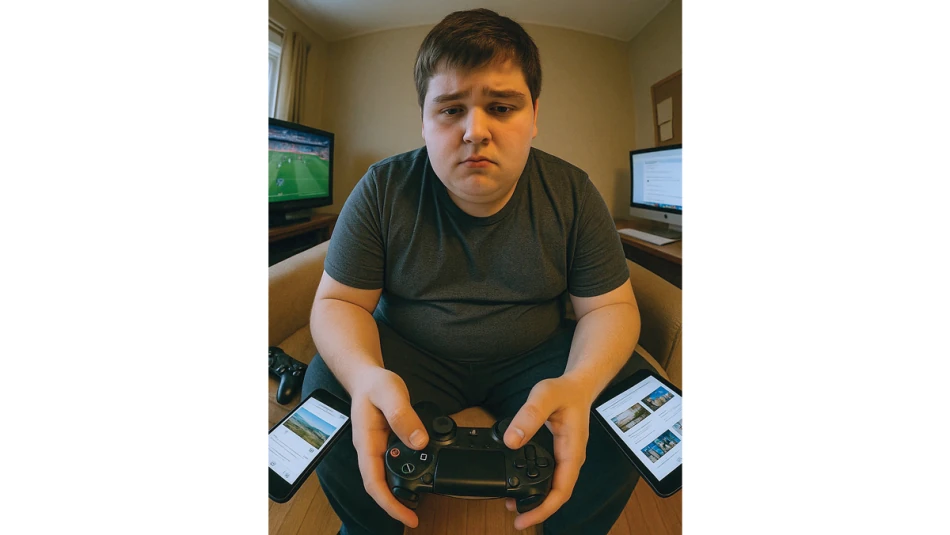
Early Warning Signs of Mental Health Issues in Gen Z: Lack of Passion and 5 Other Indicators
Generation Z Faces Unprecedented Mental Health Crisis as Digital Natives Come of Age
Medical professionals are sounding the alarm about Generation Z's deteriorating mental and physical health, marking the first generation to grow up entirely immersed in digital environments. Born between 1997 and 2012, these digital natives now face a perfect storm of psychological disorders, social skill deficits, and physical health complications that could reshape how societies approach youth wellness and education systems worldwide.
The Digital Generation's Health Emergency
Generation Z, currently aged 13 to 28, represents a watershed moment in human development. Unlike previous generations who adapted to technology, Gen Z was born into it. Social media platforms, smartphones, and constant connectivity have fundamentally shaped their neurological and social development from infancy—creating both unprecedented opportunities and alarming health consequences.
Medical experts have identified four critical health challenges plaguing this demographic: sleep and eating disorders, rising obesity rates, increased diabetes risk, and a surge in mental health issues including depression, anxiety, low self-esteem, identity disorders, social isolation, and chronic loneliness.
Sleep Disruption and Metabolic Consequences
Dr. Hind Makki, a general practitioner specializing in youth health, explains that blue light exposure from screens, particularly during nighttime hours, disrupts melatonin production and natural circadian rhythms. This creates a cascading effect: daytime drowsiness leads to poor academic performance, which increases stress and perpetuates unhealthy digital habits.
The sedentary lifestyle accompanying excessive screen time has contributed to unprecedented obesity rates among teenagers. More concerning, prolonged sitting without adequate movement reduces cellular insulin sensitivity, creating pathways to Type 2 diabetes—a condition traditionally associated with much older populations.
The Social Skills Deficit Crisis
Perhaps most troubling is Generation Z's documented weakness in five essential life skills: face-to-face communication, building relationships outside digital spaces, emotional regulation including patience and self-control, real-world problem-solving abilities, and adapting to daily pressures without technological crutches.
Dr. Rehab Youssef Al-Saadi, a family medicine specialist, notes that this generation's rapid intellectual independence—fueled by unlimited information access—has paradoxically created emotional dependence and decision-making paralysis. The constant availability of quick digital solutions has atrophied their capacity for sustained effort and delayed gratification.
Comparing Global Responses
Unlike countries such as South Korea and China, which have implemented strict digital wellness regulations for minors, most Western nations and Gulf states have taken a hands-off approach. South Korea's "Cinderella Law" restricts online gaming for under-16s between midnight and 6 AM, while China limits gaming to three hours weekly for minors. These interventions, though controversial, have shown measurable improvements in sleep patterns and academic performance.
Mental Health: The Invisible Epidemic
Dr. Riad Khudeir, a psychiatric consultant, describes an "unprecedented rise" in anxiety and depression rates among those under 25, particularly accelerated by the COVID-19 pandemic. Social media platforms, while connecting users globally, have created toxic environments of constant comparison and unrealistic standards.
The phenomenon of "trend culture"—where social validation depends on keeping pace with rapidly changing online content—creates chronic stress responses typically seen in high-pressure professional environments. Cyberbullying, once confined to school hours, now follows young people home through their devices, eliminating traditional safe spaces.
Early Warning Signs Parents Must Recognize
Medical professionals emphasize six critical warning signs that families should never dismiss as "just a phase": sudden mood changes, social withdrawal, loss of passion for previously enjoyed activities, sleep or appetite disturbances, chronic fatigue, and excessive smart device usage that interferes with daily functioning.
Investment and Policy Implications
This mental health crisis represents both a societal challenge and an economic opportunity. The global digital wellness market is projected to reach $18.6 billion by 2027, driven largely by Gen Z's needs. Companies developing screen-time management apps, digital detox programs, and mental health platforms are seeing unprecedented demand.
Educational institutions face pressure to redesign curricula that balance academic achievement with emotional intelligence and real-world skills development. This shift could reshape the $6 trillion global education market, favoring institutions that successfully integrate digital literacy with human-centered learning approaches.
The Path Forward: Digital Wisdom Over Digital Detox
Rather than advocating complete technology avoidance—which experts acknowledge is unrealistic—medical professionals recommend "digital wisdom": conscious, purposeful technology use that supports rather than undermines human flourishing.
Successful interventions require collaboration between families, schools, and communities. Practical strategies include enforcing screen-free periods before bedtime, encouraging regular physical activity, promoting healthy eating habits away from devices, and most importantly, creating daily opportunities for meaningful face-to-face dialogue.
Redefining Parental Engagement
The traditional model of parental oversight—monitoring and restricting—has proven inadequate for the digital age. Instead, experts advocate for "digital companionship": parents engaging with their children's online experiences, understanding their digital communities, and providing guidance rather than judgment.
This approach recognizes that Generation Z is more willing than previous generations to discuss mental health challenges, thanks to reduced stigma in online communities. However, translating this openness into effective real-world support systems remains a critical challenge.
Long-term Consequences for Society
Generation Z's mental health crisis will reshape multiple sectors over the coming decades. Healthcare systems must prepare for sustained demand for youth mental health services. Employers will need to adapt workplace cultures for a generation that prioritizes mental wellness and work-life balance differently than their predecessors.
The economic implications are substantial: untreated mental health issues in young adults cost economies billions in lost productivity, increased healthcare expenditures, and social services strain. Conversely, successful interventions during these formative years could yield tremendous long-term benefits for both individuals and society.
The stakes could not be higher. How successfully we address Generation Z's unique challenges will determine not only their individual futures but the trajectory of human society as it becomes increasingly digitized. The question is no longer whether digital technology affects human development—it's whether we can harness its benefits while mitigating its considerable risks.
Most Viewed News

 Sara Khaled
Sara Khaled






